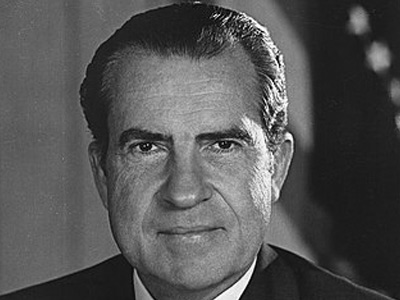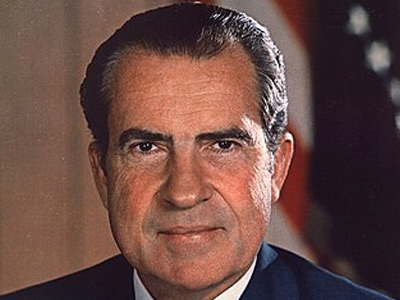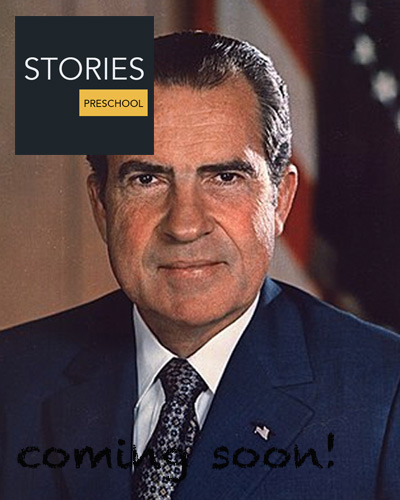Watergate
The term Watergate has come to encompass an array of clandestine and often illegal activities undertaken by members of the Nixon administration. Those activities included "dirty tricks," such as bugging the offices of political opponents, and the harassment of activist groups and political figures. The activities were brought to light after five men were caught breaking into the Democratic party headquarters at the Watergate complex in Washington, D.C. on June 17, 1972. The Washington Post picked up on the story; reporters Carl Bernstein and Bob Woodward relied on an informant known as "Deep Throat"—later revealed to be Mark Felt, associate director at the FBI—to link the men to the Nixon administration. Nixon downplayed the scandal as mere politics, calling news articles biased and misleading. A series of revelations made it clear that the Committee to Re-elect President Nixon, and later the White House, was involved in attempts to sabotage the Democrats. Senior aides such as White House Counsel John Dean faced prosecution; in total 48 officials were convicted of wrongdoing.
In July 1973, White House aide Alexander Butterfield testified under oath to Congress that Nixon had a secret taping system and recorded his conversations and phone calls in the Oval Office. These tapes were subpoenaed by Watergate Special Counsel Archibald Cox; Nixon provided transcripts of the conversations but not the actual tapes, citing executive privilege. With the White House and Cox at loggerheads, Nixon had Cox fired in October in the "Saturday Night Massacre"; he was replaced by Leon Jaworski. In November, Nixon's lawyers revealed that a tape of conversations held in the White House on June 20, 1972, had an 18 1⁄2 minute gap. Rose Mary Woods, the President's personal secretary, claimed responsibility for the gap, saying that she had accidentally wiped the section while transcribing the tape, but her story was widely mocked. The gap, while not conclusive proof of wrongdoing by the President, cast doubt on Nixon's statement that he had been unaware of the cover-up.
Though Nixon lost much popular support, even from his own party, he rejected accusations of wrongdoing and vowed to stay in office. He admitted he had made mistakes but insisted he had no prior knowledge of the burglary, did not break any laws, and did not learn of the cover-up until early 1973. On October 10, 1973, Vice President Agnew resigned for reasons unrelated to Watergate: he was convicted on charges of bribery, tax evasion and money laundering during his tenure as governor of Maryland. Believing his first choice, John Connally, would not be confirmed by Congress, Nixon chose Gerald Ford, Minority Leader of the House of Representatives, to replace Agnew. One researcher suggests Nixon effectively disengaged from his own administration after Ford was sworn in as Vice President on December 6, 1973.
On November 17, 1973, during a televised question-and-answer session, with 400 Associated Press managing editors Nixon said, "People have got to know whether or not their President is a crook. Well, I'm not a crook. I've earned everything I've got."
The legal battle over the tapes continued through early 1974, and in April Nixon announced the release of 1,200 pages of transcripts of White House conversations between himself and his aides. The House Judiciary Committee opened impeachment hearings against the President on May 9, 1974, which were televised on the major TV networks. These hearings culminated in votes for impeachment. On July 24, the Supreme Court ruled unanimously that the full tapes, not just selected transcripts, must be released.
The scandal grew to involve a slew of additional allegations against the President, ranging from the improper use of government agencies to accepting gifts in office and his personal finances and taxes; Nixon repeatedly stated his willingness to pay any outstanding taxes due, and later paid $465,000 (equivalent to $2.4 million in 2019) in back taxes in 1974.
Even with support diminished by the continuing series of revelations, Nixon hoped to fight the charges. But one of the new tapes, recorded soon after the break-in, demonstrated that Nixon had been told of the White House connection to the Watergate burglaries soon after they took place, and had approved plans to thwart the investigation. In a statement accompanying the release of what became known as the "Smoking Gun Tape" on August 5, 1974, Nixon accepted blame for misleading the country about when he had been told of White House involvement, stating that he had had a lapse of memory. Senate Minority Leader Hugh Scott, Senator Barry Goldwater, and House Minority Leader John Jacob Rhodes met with Nixon soon after. Rhodes told Nixon he faced certain impeachment in the House. Scott and Goldwater told the president that he had, at most, only 15 votes in his favor in the Senate, far fewer than the 34 needed to avoid removal from office.
Resignation
In light of his loss of political support and the near-certainty that he would be impeached and removed from office, Nixon resigned the presidency on August 9, 1974, after addressing the nation on television the previous evening. The resignation speech was delivered from the Oval Office and was carried live on radio and television. Nixon said he was resigning for the good of the country and asked the nation to support the new president, Gerald Ford. Nixon went on to review the accomplishments of his presidency, especially in foreign policy. He defended his record as president, quoting from Theodore Roosevelt's 1910 speech Citizenship in a Republic:
Sometimes I have succeeded and sometimes I have failed, but always I have taken heart from what Theodore Roosevelt once said about the man in the arena, "whose face is marred by dust and sweat and blood, who strives valiantly, who errs and comes up short again and again because there is not effort without error and shortcoming, but who does actually strive to do the deed, who knows the great enthusiasms, the great devotions, who spends himself in a worthy cause, who at the best knows in the end the triumphs of high achievements and who at the worst, if he fails, at least fails while daring greatly".
Nixon's speech received generally favorable initial responses from network commentators, with only Roger Mudd of CBS stating that Nixon had not admitted wrongdoing. It was termed "a masterpiece" by Conrad Black, one of his biographers. Black opined that "What was intended to be an unprecedented humiliation for any American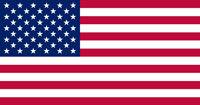 The United States of America (U.S.A. or USA), commonly known as the United States (U.S. or US) or America, is a country in North America. It is the world's third-largest country by both land and total area. The United States shares land borders with Canada to its north and with Mexico to its south. The national capital is Washington, D.C., and the most populous city and financial center is New York City. president, Nixon converted into a virtual parliamentary acknowledgement of almost blameless insufficiency of legislative support to continue. He left while devoting half his address to a recitation of his accomplishments in office."
The United States of America (U.S.A. or USA), commonly known as the United States (U.S. or US) or America, is a country in North America. It is the world's third-largest country by both land and total area. The United States shares land borders with Canada to its north and with Mexico to its south. The national capital is Washington, D.C., and the most populous city and financial center is New York City. president, Nixon converted into a virtual parliamentary acknowledgement of almost blameless insufficiency of legislative support to continue. He left while devoting half his address to a recitation of his accomplishments in office."
HISTORY
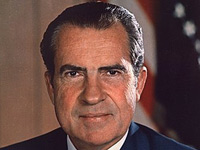
RESOURCES
This article uses material from the Wikipedia article "Richard Nixon (1913-1994)", which is released under the Creative Commons Attribution-Share-Alike License 3.0.
© Stories Preschool. All Rights Reserved.
